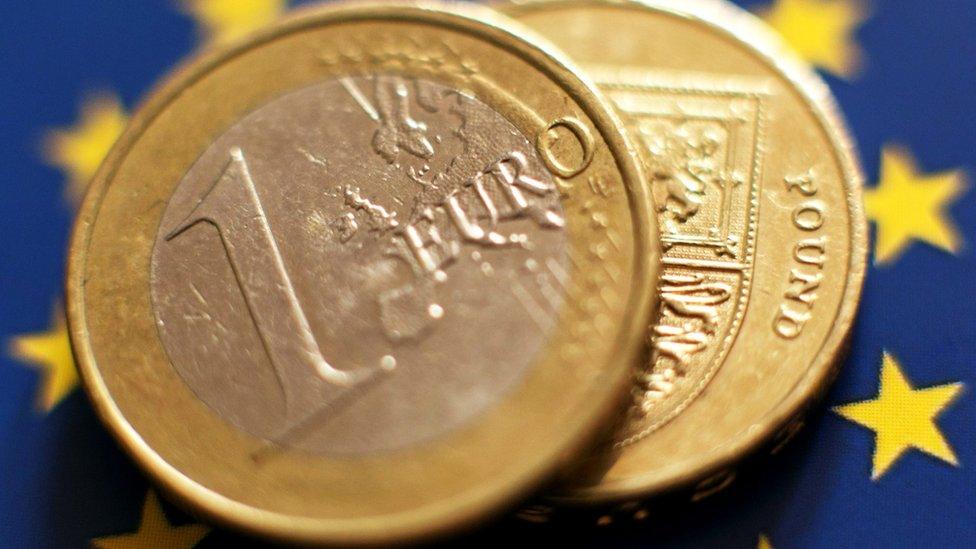Reality Check: What has Brexit done to the economy?
- Published

The claim: The damage done to the economy has already been many times the value of the UK's contribution to the EU Budget.
Reality Check verdict: There may already have been an impact on the economy or the public finances but we do not yet have data showing that. The indicative cost of borrowing for the government has actually fallen.
Chancellor of the Exchequer George Osborne says that companies have already started cutting back on investments following the vote to leave the European Union.
He may be right - we have not yet seen any data on this yet.
But social media has been full of claims that the amounts lost already have been many times the value of the UK's annual contribution to the EU Budget.
The figure that was used throughout the campaign was that national income growing by as little as 0.5% less than it would have done if the UK had stayed in the EU would wipe out the money saved from not contributing to the EU Budget.
That's a good, clear comparison, because it's comparing how much the government gains with how much it loses.
We're not going to get any reliable figures on that for a while. Growth figures for March to June will be out on 27 July, but the referendum was really too late in the quarter for the result to make any difference, although uncertainty linked to the fact that the referendum was happening at all, probably will make a difference.
So we're unlikely to hear anything relevant about GDP until we get the first economic surveys indicating what the economy was doing in July - the purchasing managers' reports - and the single month estimates from the economic think-tank National Institute of Economic and Social Research (NIESR).
So what has happened that we know about so far?
Credit ratings
The ratings agencies Fitch and S&P have indeed downgraded the UK's credit rating, meaning they think that lending money to the UK government is less safe than it was last week.
You would expect that to mean the government would have to pay more to borrow money - the Office for Budget Responsibility says that an extra one percentage point on the government's cost of borrowing would cost the exchequer an extra £8bn in 2019-20.
But in fact, what has happened is that the yield, or return, on government bonds (which is a good indicator of the interest rate the government would have to pay to borrow money) has fallen, because in uncertain times people look for relatively safe investments, such as government bonds.
So given the evidence so far, the interest paid on gilts (UK government bonds) will fall, saving the government money, although it is also likely that inflation will rise, which will increase the amount the government has to pay on loans linked to the inflation rate.
Paul Johnson from the Institute for Fiscal Studies points out that will also be offset by the government having to borrow more money as economic growth slows: "Overall the public finances will be in worse state and so debt interest will be higher. And in the long run rates might rise. But for now economic weakness seems to be accompanied by a fall in gilt rates as people look for safer investments."
What about stock markets?
There is no question that there were big falls in stock markets in the UK and around the world last Friday, although there have been considerable recoveries this week.
The FTSE 100 is less of an indicator of the state of the UK economy than wider indexes such as the FTSE 250, because it is dominated by multinational companies, many of which are more sensitive to commodity prices than to what is happening in the UK.
How does that affect the economy as a whole or the public finances?
There were figures around for the amount that the deficits of defined benefit pension schemes had grown - some people were comparing that with the EU Budget contribution, although it is not really a comparable figure, and the deficits will have improved somewhat in the last few days of recoveries.
The thing with share prices falling is that you only lose money if you sell your shares, so many of the losses have only been on paper. That's a problem for pension schemes that have to report current value, but other investors can hang on and see if anything improves.
One impact on the government is the effect on the value of its holdings in banks. The value of the government's holding in RBS and Lloyds Banking Group dropped by about £8bn, although it has recovered somewhat since.
Clearly that is only a paper loss, but it presumably delays the day when the government will be able to sell its stake.
What about the pound?
The pound has dropped considerably against the US dollar, less so against the euro.
That has not had a great deal of impact on the economy so far, although it is likely to stoke inflation in due course.
National income is reported in pounds so will not be hit automatically by a weaker pound, although it will suffer in comparison with other countries - the status as the world's fifth biggest economy may be threatened.



- Published22 February 2016
